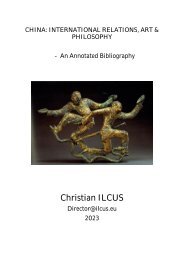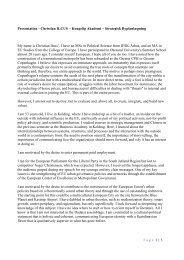diplomacy in antiquity
This is a review piece of books on diplomacy in antiquity begiining with mesopotamia, amarna, the phoenicians, the greeks and romans. The amarna book I found at an exposition at Glyptoteket, CPH.
This is a review piece of books on diplomacy in antiquity begiining with mesopotamia, amarna, the phoenicians, the greeks and romans. The amarna book I found at an exposition at Glyptoteket, CPH.
Create successful ePaper yourself
Turn your PDF publications into a flip-book with our unique Google optimized e-Paper software.
Ro-man strategy was thus initially characterized by a distinct economy-of-force and the use of
subsumed clients as auxiliary forces. A constant presence at the borders created a psychology of the
empire, which helped instill a sense of security. The neighbors always remembered who was in
charge and could always count on massive retaliation, if not annihilation, as a last option from the
citizen army of the Roman Senate and People. Luttwark ( 1976) recounts how “diplomatic relations
were less stable, partly because the power of those who dealt with Rome was itself less stable;
moreover, these clients, who were migratory if not nomadic, had a last resort that the territorial
client states of the East never had – migration beyond the reach of Roman power.” In a later stage,
this grand strategy ceased existing as Rome took on the quality of an empire. Rome then adopted a
perimeter defense, linked up with Via Romana, communications, and troop basing. The total
deployment, including expeditionary forces, never exceeded 350,000 men, and they all and each of
them had to contend with requirements of strategic depth, rear-area security, and economy of
deployment. Despite the Augustan principate, the mixture of poor and scattered border defense and
internal turmoil in conjunction with administrative inefficiency and venality, the dispersal of the
Realm and the lack of a logic of collective security, popular foundation, and the pressures on the
borders got the better of the Roman empire. The Roman Empire ended its career by adopting a God
called Christ, which, through the Church of Christ, perpetuated the empire’s life beyond the age of
the realm its rites were meant to serve. At the time, God’s son appeared like an odd figure. In the
late Roman and Byzantine empires, God’s son became a God proper and was subsequently
reincarnated as part of the Holy Trinity. To posterity, it ensured that Rome was never forgotten.
The lessons learned: Diplomacy is about the relativization of borders. Diplomacy is an evolving
enterprise whose manifestation and origin may be captured in terms of both a regional system over
the long haul and the personalities that inhabit it. Diplomacy always proceeds from actors, not the
9








